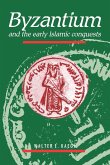Please note that the content of this book primarily consists of articles available from Wikipedia or other free sources online. Muslim conquests also referred to as the Islamic conquests or Arab conquests, of non-Arab peoples began after the death of the Islamic prophet Muhammad. He established a new unified political polity in the Arabian Peninsula which under the subsequent Rashidun and Umayyad Caliphates saw a century of rapid expansion of Muslim power. They grew well beyond the Arabian Peninsula in the form of a Muslim Empire with an area of influence that stretched from the borders of China and India, across Central Asia, the Middle East, North Africa, southern Italy, and the Iberian Peninsula, to the Pyrenees. The Muslim conquests brought about the collapse of the Sassanid Empire and a great territorial loss for the Byzantine Empire. The reasons for the Muslim success are hard to reconstruct in hindsight, primarily because only fragmentary sources from the period have survived. Most historians agree that the Sassanid Persian and Byzantine Roman empires were militarily and economically exhausted from decades of fighting one another.
Bitte wählen Sie Ihr Anliegen aus.
Rechnungen
Retourenschein anfordern
Bestellstatus
Storno








